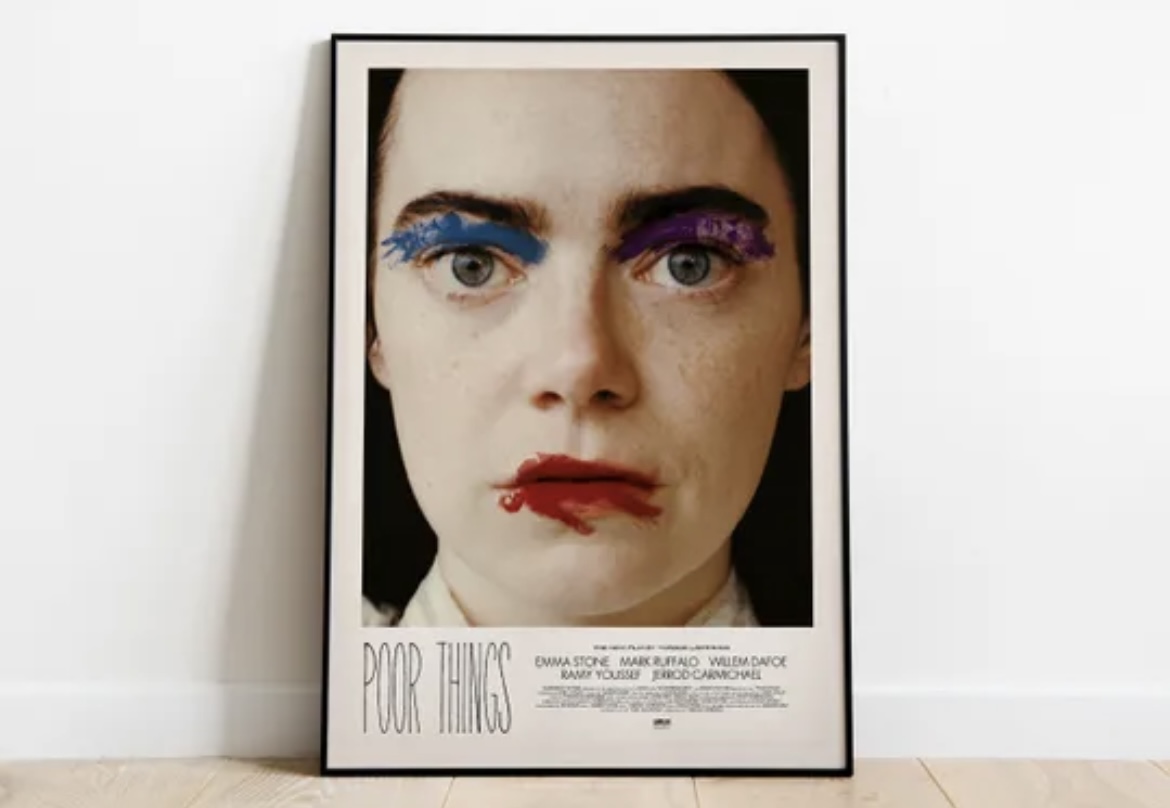‘Poor Things’ wholeheartedly enjoyable art despite its problems

“Poor Things” (2023) is a movie unlike any I’ve ever seen, directed by the quirky Yorgos Lanthimos, a director who has never shied away from the uncomfortable and bizarre, it is both hard to watch and incredibly eye-catching and engaging, with rapturous, beautiful visuals, an abundance of grating, uncensored sexuality, and a boatload of humanity.
It stars Emma Stone as Bella Baxter, an adult woman who relives life over when she dies by suicide while she is pregnant. A mad scientist named Dr. Godwin (played perfectly by Willem Dafoe) discovers her body and brings her back to life by transplanting her brain with her unborn infant’s brain.
The film is set in a reimagined 19th-century world. The home of Dr. Godwin (whom she refers to as God) is a wonderland filled with deranged experiments like chickens with bulldog heads. The house is a palace that Bella is trapped in with a barely developed brain, so she stumbles around as she learns to speak.
Her brain begins rapidly aging within a matter of days, and while viewers are looking at Bella’s face and body, which remain the same, they watch her behaviors for clues about which stages of development she is in. She relearns how to speak and behave, moving from blabbering and throwing food like a toddler to speaking and having more emotional tantrums like a teenager.
Eventually, at this stage, she begins exploring her sexuality, touching herself, and then soon having sex with a man, Duncan Wedderburn (played by Mark Ruffalo), whom she runs off with. At the same time, she is engaged to Dr. Godwin’s assistant, a young man who fell in love with her while collecting data on her behaviors. She has no say in this engagement, and disregards it in her desire to see the world.
The core of this film is to imagine what a woman’s sexuality would look like unhindered by social expectations in a world where she have no autonomy.
I found the relationship between Bella and Wedderburn hilariously overdone. Ruffalo is wonderfully dramatic, and, if it was toned down, an accurate portrayal of over-possessiveness and objectification.
He quickly becomes utterly obsessed with Bella because of her underdeveloped brain and grown woman’s body, but when he realizes she has no emotional attachment or reliance on him, begins to spiral into insanity. When she does things without him, he lashes out and eventually kidnaps her. I found the extremes of this movie very life-like in that sense, and I adored Bella for not caring about it or him at all.
In my opinion, there are many benefits and drawbacks to the film. Initially, I found it problematic bordering on pedophiliac because she was sexualized as a young girl in an adult woman’s body. I understood why it was there; the movie is focused on breaking the norms and showing that women can experience sexual pleasure even from a young age. But her awakening happens so early on when she is surrounded by adult men who take advantage of her young naivete.
However, I found myself struck by the oddity of the set design and world-building and it was easy to move past the uncomfortable scenes. The film’s intoxicating cinematography, costumes, fish-eye angles, and manner of speech pulled me away.
I was also impressed by the acting. Emma Stone’s performance as Bella was superb, especially her mannerisms and speech as they developed throughout the movie and she slowly grew up and into a fuller person. She was jarring, uncomfortable, and uncanny, but loveable, intelligent, and kind all the same.
However, I wish it had been directed by someone more thoughtful and connected to the complexities of the female body, but it was directed by a man. It inevitably, though enjoyable, kicks itself in the ass. What is the message, the theme? Women can enjoy sex? Men are obsessed with naivete? That women are never free, always trapped and manipulated into sexual exploitation?
But clashing with all that is its fresh newness and exuberance, and maybe that’s why everyone seems to be able to ignore its plethora of faults. Nothing like this movie has ever been done before. I wholeheartedly enjoyed “Poor Things,” despite some of its hollowness, old feminism, and woman-created-through-a-mans-eyes-ness. I do think it’s very important to both enjoy art and think critically about it and that’s definitely where this movie left me














